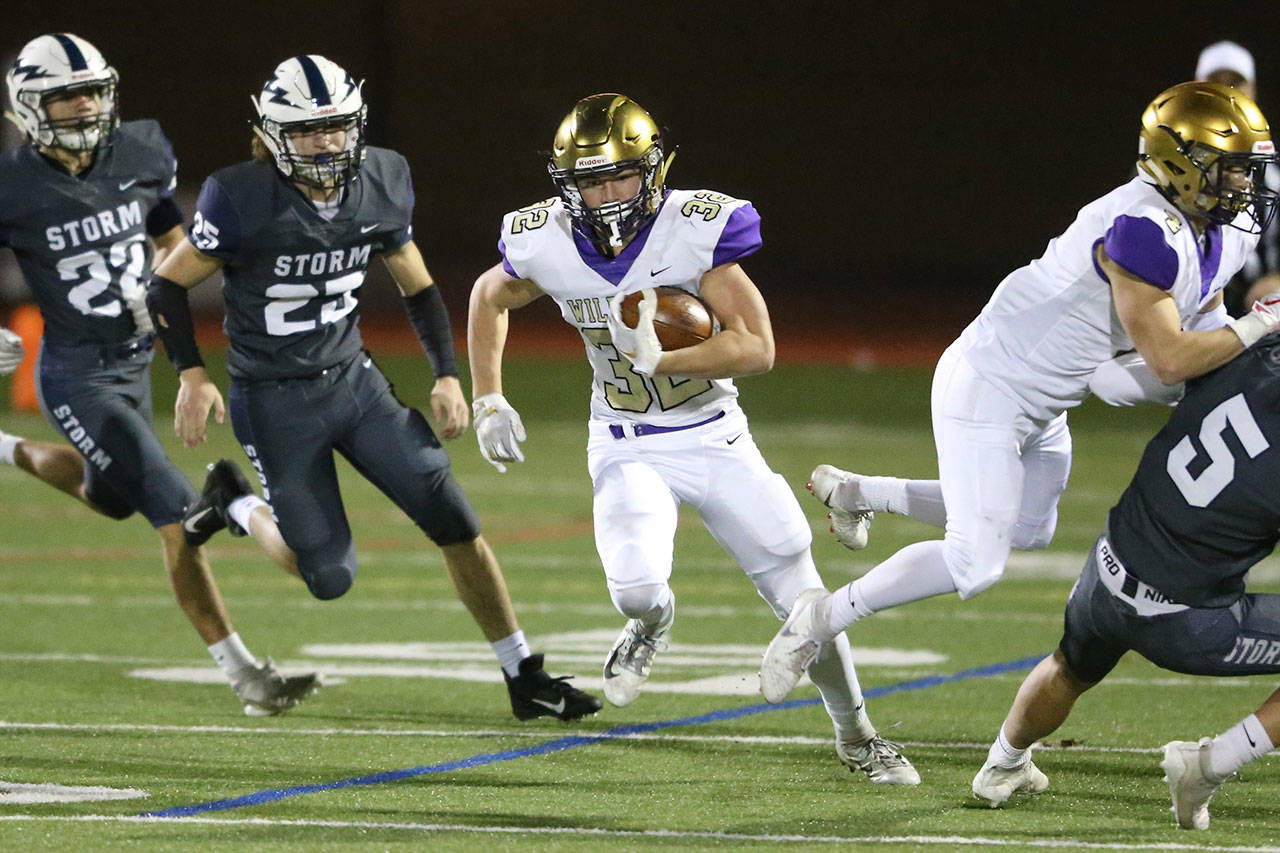Friday nights will need a little less artificial light when the high school football season rolls around this coming school year.
The Washington Interscholastic Activities Association announced Tuesday, July 21, that football will be moved to the spring.
The switch was one of many changes in prep athletics made by the WIAA in the wake of the coronavirus.
High school sports, traditionally split over three seasons, will be divided into four shortened seasons this school year.
The first will run Sept. 7 through Nov. 8 and will include what the WIAA deems “low-risk” sports: cross country, boys tennis and possibly girls swimming. Because swimming is an indoor sport, the WIAA will work with the state department of health to see if it can be safely held.
Generally, the fall season goes from late August to mid November.
The WIAA left November and December open to allow for flexibility in completing Season 1.
Season 2 is set for Jan. 4 through March 7 and includes the traditional winter sports: basketball, wrestling, boys swim and competitive cheer.
In past years, the winter season went from mid November until mid March.
Season 3, March 1 through May 2, includes the traditional fall sports: football, volleyball and girls soccer. Small schools (including Coupeville), which normally play boys soccer in the fall, will play during this season.
Season 4 goes from April 26 until June 27 and will include the traditional spring sports: baseball, softball, track and field, girls tennis, golf and boys soccer.
Normally the spring season begins in late February and ends Memorial Day weekend.
Oak Harbor High School football coach Marcus Hughes agrees with the delay of the football season.
“I am just happy we are playing in these tough times,” he said. “I would prefer we start in the spring than start this fall and then have the season cancelled. We have a good group of seniors, and it will give them an opportunity to play.
“Some people are upset about the change (spring start, shorter season), but this is about the kids. We want all the sports to get a chance to play. Everyone has to make changes and work together.”
The late start for football may also be a blessing in disguise, according to Hughes.
His young team has more time to get physically ready for the new season.
“The kids are doing a tremendous job in the weight room,” he said.
The dates for the new seasons are “definitely written in pencil,” WIAA Executive Director Mick Hoffman said in a Zoom call with media members.
Season 1 is the least certain, according to Hoffman. Counties need to be in Phase 3 to compete in the low-risk sports offered in the new format. While Island County is in Phase 3, all surrounding counties are still in Phase 2.
If health conditions don’t allow for Season 1, some of the Season 1 sports may be moved to the spring, according to Executive Board President Greg Whitmore. It is possible that no sports may be played before January, he added.
The Washington State Department of Health will provide guidelines to the WIAA about allowing spectators. Hoffman said fans will likely be able to attend events in Season 1 because the sports (except swimming) are played outdoors and provide room for social distancing.
An additional area of concern is the availability of game officials, who are in short supply even in the best of times. In a survey of officials, about 30 percent said they were not comfortable working under current health conditions, according to the WIAA.
Schools also need to decide if they will allow athletes to use school facilities if no on-site classes are being held in the district.
The three Whidbey Island high school athletic directors said they were “excited” about the WIAA’s announcement.
“It’s nice that the WIAA put something together,” Coupeville Athletic Director Willie Smith said. “It gives schools a little bit of direction.”
South Whidbey’s Paul Lagerstedt called it a “good start.”
“We have to have a plan to work off of, and it buys us some time,” he added. “The WIAA is not done yet, but we appreciate the plan and it gives us hope and encouragement. It is good that it includes all sports.”
Oak Harbor’s Jerrod Fleury said, “They (the WIAA) have a lot of things they need to sort out — particularly transportation, schedules and state tournaments — but I am glad to have a plan to work from.”
All three Whidbey Island athletic directors noted that unless more counties advance to Phase 3, their schools may not have teams to compete against. All of the counties which include Coupeville, Oak Harbor and South Whidbey’s conference opponents are currently in Phase 2.



